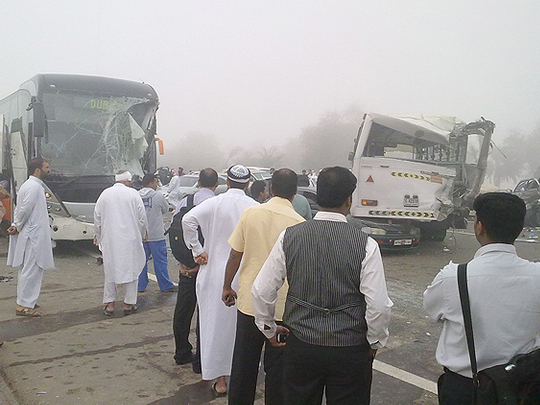
Abu Dhabi: Up to 85 per cent of accidents occur due to reckless driving, Brigadier General Hussain Al Ahmad Al Harthi, Director of Traffic and Patrol, Abu Dhabi Police told Gulf News in reaction to the 127 car pile up on Saturday morning.
"In addition to recklessness, the Abu Dhabi - Dubai highway, which is one of the busiest roads in the UAE, is smooth and wide,which provides tempting reasons to over speed for some drivers on the road. Sixty-one people were injured and one died as a result of the car crash that occurred early Saturday morning in Al Samha. One of the main causes attributed for the crash was speeding, with many estimated to have continued driving at speeds of up to 140km/hr despite the heavy fog that occurred in the area.
The visibility at the time of the crash was, however poor.
"People who commute between Abu Dhabi and Dubai are always in a rush to reach their homes and in some occasions they ignore the fact that driving in foggy days requires special attention," Brig. Al Harthi said.
He also confirmed to Gulf News that there are no engineering defaults on the Abu Dhabi - Dubai highway.
"Traffic and patrol officers are currently meeting to analyse the car pile up that occurred Saturday morning. We cannot give details about what we plan to do yet, but I can assure everyone that the Abu Dhabi police do have plans to deal with similar accidents in the near future," Brig Al Harthi said.
"While yesterday visibility in Al Samha was reduced to less than 50 km, visibility this morning was quite high, as the area only experienced a light mist. Tomorrow morning will be clear, with a very low possibility for mist" said a spokesperson from the National Centre of Meteorology & Seismology in Abu Dhabi.
A leading road and traffic expert told Gulf News that although the Abu Dhabi-Dubai road was not the riskiest highway in the country, it was particularly dangerous during bad weather conditions because there were no alternative roads for drivers to take.
"From Abu Dhabi till the border of Dubai, drivers can only take one road. So even if they know that there is an incident, they cannot take an alternative road and this increases the scale of the accidents occurring on it," the expert said.
He explained that because of that, drivers had to be particularly careful during low visibility conditions.
"Slow down to a speed that matches your visibility level, so that if you can only see five metres, you should be able to stop within that range. And of course, it is best to get off the road and wait at a fuel station until you are certain that the road ahead of you has cleared," he added.
Brigadier Al Harthi urged motorists to respect the traffic laws and to take caution when driving on highways, especially when faced with weather situations including rain and fog that may cause a severe reduction in visibility.
"With the fast rhythm of life, more and more drivers are becoming nervous on the road, which leads to accidents and reckless behaviour. I suggest that people care a bit more about themselves and for the drivers around them, because at the end, you will eventually reach your destination safely," Brig. Al Harthi said.
No additional accidents or congestion were reported along the Abu Dhabi-Dubai highway on Sunday morning, a police spokesperson told Gulf News.
"Traffic flow was smooth on both sides of the Abu Dhabi - Dubai highway, with no reported incidents occurring this morning. We are still investigating the cause of the pile up and are currently compiling data from various sources to help us determine what triggered the crash," the spokesperson said.
Fog expected in UAE
Fog is expected to occur over the next two months as UAE experiences fog season
The UAE is currently experiencing fog season, which occurs every year from March until the first of May,. As a result of that, fog will continue to take place until summer arrives, a spokesperson from the National Centre of Meteorology & Seismology in Abu Dhabi told Gulf News.
"Because the seasons are changing from winter to summer many environmental elements come together to form various weather conditions, including fog. Fog occurs when high humidity, cooling, variable winds and clear skies interact with one another…the degree of a fog's thickness is dependent more on those elements than the particular area where it is experienced," he said.
Compiled by Nathalie Farah, Staff Reporter











